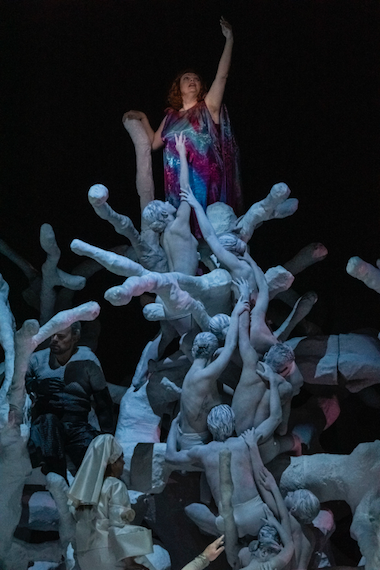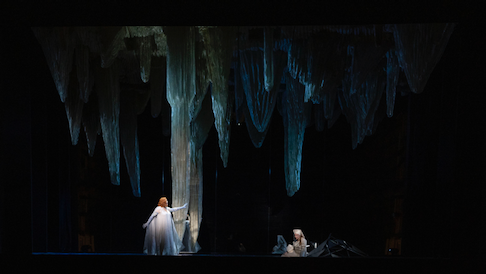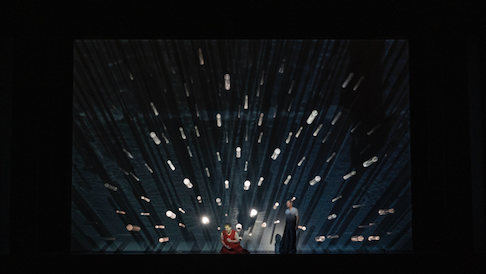Recently in Reviews
English Touring Opera are delighted to announce a season of lyric monodramas to tour nationally from October to December. The season features music for solo singer and piano by Argento, Britten, Tippett and Shostakovich with a bold and inventive approach to making opera during social distancing.
This tenth of ten Live from London concerts was in fact a recorded live performance from California. It was no less enjoyable for that, and it was also uplifting to learn that this wasn’t in fact the ‘last’ LfL event that we will be able to enjoy, courtesy of VOCES8 and their fellow vocal ensembles (more below …).
Ever since Wigmore Hall announced their superb series of autumn concerts, all streamed live and available free of charge, I’d been looking forward to this song recital by Ian Bostridge and Imogen Cooper.
The Sixteen continues its exploration of Henry Purcell’s Welcome Songs for Charles II. As with Robert King’s pioneering Purcell series begun over thirty years ago for Hyperion, Harry Christophers is recording two Welcome Songs per disc.
Although Stile Antico’s programme article for their Live from London recital introduced their selection from the many treasures of the English Renaissance in the context of the theological debates and upheavals of the Tudor and Elizabethan years, their performance was more evocative of private chamber music than of public liturgy.
In February this year, Albanian soprano Ermonela Jaho made a highly lauded debut recital at Wigmore Hall - a concert which both celebrated Opera Rara’s 50th anniversary and honoured the career of the Italian soprano Rosina Storchio (1872-1945), the star of verismo who created the title roles in Leoncavallo’s La bohème and Zazà, Mascagni’s Lodoletta and Puccini’s Madama Butterfly.
Evidently, face masks don’t stifle appreciative “Bravo!”s. And, reducing audience numbers doesn’t lower the volume of such acclamations. For, the audience at Wigmore Hall gave soprano Elizabeth Llewellyn and pianist Simon Lepper a greatly deserved warm reception and hearty response following this lunchtime recital of late-Romantic song.
Collapsology. Or, perhaps we should use the French word ‘Collapsologie’ because this is a transdisciplinary idea pretty much advocated by a series of French theorists - and apparently, mostly French theorists. It in essence focuses on the imminent collapse of modern society and all its layers - a series of escalating crises on a global scale: environmental, economic, geopolitical, governmental; the list is extensive.
For this week’s Live from London vocal recital we moved from the home of VOCES8, St Anne and St Agnes in the City of London, to Kings Place, where The Sixteen - who have been associate artists at the venue for some time - presented a programme of music and words bound together by the theme of ‘reflection’.
'Such is your divine Disposation that both you excellently understand, and royally entertaine the Exercise of Musicke.’
Amongst an avalanche of new Mahler recordings appearing at the moment (Das Lied von der Erde seems to be the most favoured, with three) this 1991 Mahler Second from the 2nd Kassel MahlerFest is one of the more interesting releases.
‘And there was war in heaven: Michael and his angels fought against the dragon; and the dragon fought and his angels, And prevailed not; neither was their place found any more in heaven … that old serpent … Satan, which deceiveth the whole world: he was cast out into the earth, and his angels were cast out with him.’
If there is one myth, it seems believed by some people today, that probably needs shattering it is that post-war recordings or performances of Wagner operas were always of exceptional quality. This 1949 Hamburg Tristan und Isolde is one of those recordings - though quite who is to blame for its many problems takes quite some unearthing.
There was never any doubt that the fifth of the twelve Met Stars Live in Concert broadcasts was going to be a palpably intense and vivid event, as well as a musically stunning and theatrically enervating experience.
‘Love’ was the theme for this Live from London performance by Apollo5. Given the complexity and diversity of that human emotion, and Apollo5’s reputation for versatility and diverse repertoire, ranging from Renaissance choral music to jazz, from contemporary classical works to popular song, it was no surprise that their programme spanned 500 years and several musical styles.
The Academy of St Martin in the Fields have titled their autumn series of eight concerts - which are taking place at 5pm and 7.30pm on two Saturdays each month at their home venue in Trafalgar Square, and being filmed for streaming the following Thursday - ‘re:connect’.
The London Symphony Orchestra opened their Autumn 2020 season with a homage to Oliver Knussen, who died at the age of 66 in July 2018. The programme traced a national musical lineage through the twentieth century, from Britten to Knussen, on to Mark-Anthony Turnage, and entwining the LSO and Rattle too.
With the Live from London digital vocal festival entering the second half of the series, the festival’s host, VOCES8, returned to their home at St Annes and St Agnes in the City of London to present a sequence of ‘Choral Dances’ - vocal music inspired by dance, embracing diverse genres from the Renaissance madrigal to swing jazz.
Just a few unison string wriggles from the opening of Mozart’s overture to Le nozze di Figaro are enough to make any opera-lover perch on the edge of their seat, in excited anticipation of the drama in music to come, so there could be no other curtain-raiser for this Gala Concert at the Royal Opera House, the latest instalment from ‘their House’ to ‘our houses’.
"Before the ending of the day, creator of all things, we pray that, with your accustomed mercy, you may watch over us."
Reviews

01 Feb 2020
Tristan und Isolde in Bologna
East German stage director Ralf Pleger promised us a Tristan unlike anything we had ever seen. It was indeed. And Slovakian conductor Jura Valčuha gave us a Tristan as never before heard. All of this just now in the most Wagnerian of all Italian cities — Bologna!
Gossip has it that Bologna’s 1871 Lohengrin was the first Wagner opera to be heard in Italy because Giuseppe Verdi did not engage the Teatro Comunale’s principle conductor Angelo Mariani to conduct the premiere of Aida in Cairo, and furthermore that Verdi had encouraged star soprano Teresa Stolz, Mariani’s lover, to leave him. Thus Mariani wreaked revenge on Verdi by bringing Verdi’s archival into Italy! Verdi did attend one of the performances of Lohengrin, and later wrote to his publisher that it made him want to throw up. It is rumored that Teresa Stolz then became Verdi’s mistress.
Tannhauser was programmed in Bologna the following year, 1872 the year Wagner accepted honorary citizenship of Bologna! Rienzi came in 1876 and Dutchman in 1877. The Teatro Comunale gave the Italian premiere of Tristan und Isolde in 1888. This 2020 production of Tristan is the twelfth in the Teatro Comunale’s history. The stage director of the 1983 third last version situated the opera in the Otto Wesendonk living room [his wife Mathilde a Wagner lover and muse], stage director Ruth Berghaus set the 1996 penultimate version on a space station.
Surely taken right in stride by the Bolognese this 2020 version occurs within a work of art, an installation that surely would be most at home in hip, chic, intellectual Berlin. Stage director Ralf Pleger and his designer Alexander Polzin are numbingly credentialed within the film/art/opera avant-garde establishment.
 Act I
Act I
The first act was in a maze of slowly, very slowly descending stalactites that illuminated, lightning-like, from within at that crucial moment, the second act was a huge revolving tumbleweed-like sculpture from which oozed white worms (dancers) in crucial moments in Wagner's love death enactment. The third act was a highly abstracted starry sky back wall that in the considerable magic of the lighting effected by John Torres sometimes appeared as a ceiling that was a floor, and at that crucial moment the wall moved in toto, somehow, startlingly forward.
 Act III
Act III
There was no action. No one drank the magic potion, the lovers never touched much less looked at one another except in rare, very rare strategic moments, Isolde did not even glance at the dead Tristan, Melot’s spear did not wound Tristan or kill Kurvenal. There was no action. None.
It was spectacular, never mind whatever philosophical underpinnings or artistic intuitions one may conjure (director Pleger suggests it as a drug trip). It was abstract art as image in music. It was not drama in music.
Musically Wagner’s opera soared within these images, conductor Valčuha finding surpassing warmth and an astounding intimacy from the Teatro Comunale’s splendid orchestra, the winds and brasses singing in tones of purest color, the tempos in spontaneous and natural unison with the text declamation and the progression of images. There was no drama, no musical trauma in Mo. Valčuha’s exposition of this Wagnerian rite.
German tenor Stefab Vinke was Tristan. Mr. Vinke began as a light lyric dramatic tenor (jugendlicher heldontenor), later adding all the Wagner heldon tenor roles to his repertoire. It was reported that he tired though the trials of Siegfried in the recent Metropolitan Opera Ring, and here there seemed to be a moment of distress in the second act love duet. But for the murderous third act monologue he was in superb voice to his death, riveting us as an image of wounded suffering in a red tunic, finally trailed by six dancers in red tunics to create a swirling red line.
King Mark was sung by German bass baritone Albert Dohmen, a formidable Bayreuth Wotan. Of imposing presence Mr. Dohmen stated the case of the betrayed king in absolute clarity and exquisite dignity, adding occasional portamento (sliding tone) in his attack of a phrase to startling vocal effect. Russian mezzo soprano Ekaterina Gubanova provided the Brangāne in gorgeous, present voice throughout, her second act warning ”Einsam wachend in der Nacht” was one of the evening’s most beautiful moments as she hung on the turning sculpture bathed in golden light. Tristan’s squire Kurvenal was sung by German baritone Martin Gantner who infused his sympathetic evening-long presence with Tristan in warmly focused voice.
The production’s Isolde was 54 year-old Danish soprano Ann Petersen. Mme Petersen produces a mighty tone that she manages with little nuance. She is an accomplished veteran of the role and thus delivered a performance that was generic though sufficient for us to understand and enjoy composer Wagner and stage director Pleger’s intentions.
Michael Milenski
Cast and production information:
Tristan: Stefan Vinke; Isolde: Ann Petersen; King Mark: Albert Dohmen; Kurwenal: Martin Gantner; Brangäne: Ekaterinburg Gubanova; Melot: Tommaso Caramia; Shepherd: Klodjan Kaçani. Chorus and orchestra of Teatro Comunale di Bologna. Conductor: Jura Valčuha; Stage Director: Ralf Pleger; Scenery: Alexander Polzin; Costumes: Wojciech Dziedzic; Lights: John Torres/Kate Bashore; Choreography: Fernando Melo. Teatro Comunale di Bologna, January 26, 2020.


